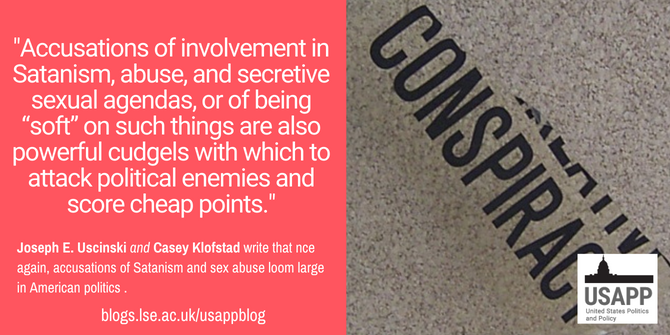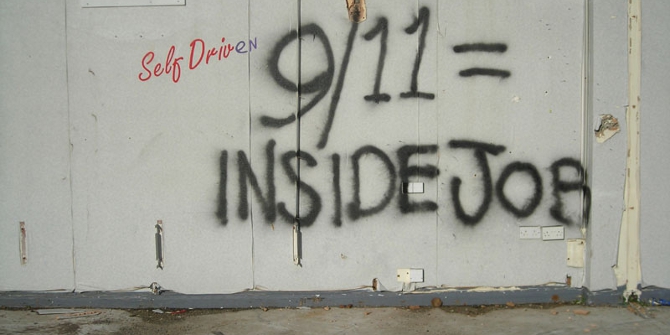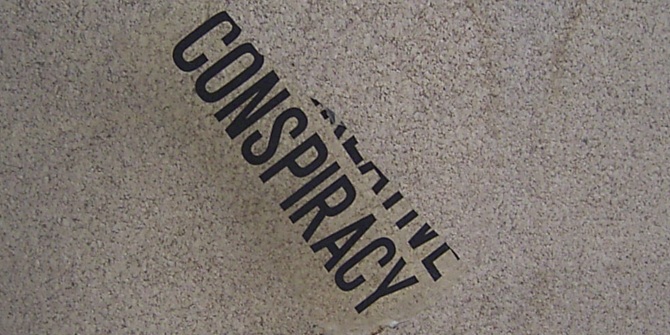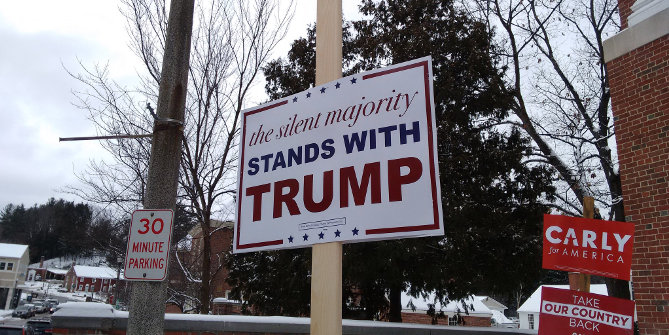
 Right wing politicians and media figures have been increasingly expressing concerns about the “grooming” of children into sexualized lifestyles and satanic activity in America. Joseph E. Uscinski and Casey Klofstad write that such concerns are a repeat of the “Satanic panic” of the 1980s and 90s. And while there is no evidence to support the concerns of conservative figures, through a new national survey, they find that over a quarter of Americans share these fears. They also find that, on some debunked claims, Democrats are just as likely to be believers as Republicans.
Right wing politicians and media figures have been increasingly expressing concerns about the “grooming” of children into sexualized lifestyles and satanic activity in America. Joseph E. Uscinski and Casey Klofstad write that such concerns are a repeat of the “Satanic panic” of the 1980s and 90s. And while there is no evidence to support the concerns of conservative figures, through a new national survey, they find that over a quarter of Americans share these fears. They also find that, on some debunked claims, Democrats are just as likely to be believers as Republicans.
Accusations involving ritual sex abuse and the sexualization of children have surged into the mainstream of American politics over the past year. In particular, conservative politicians and opinion leaders have increasingly expressed concerns about Satan, Satanists, sex “grooming”, and the supposed “agenda” by public schools and entertainment companies to indoctrinate children into sexualized lifestyles or to turn them gay or trans.
Such discourse is not new. In the 1980s and 90s, a Satanic panic led Americans to see Satan “in every heavy metal album, Smurfs episode, and Dungeons & Dragons game.” Even the Proctor and Gamble corporation was supposedly “in league with the devil.” As the panic wore on into the 1990s, it became a vehicle for expressing fears over social change, and in particular how children would be exposed to liberalized views on sexuality.
These mass panics are not without real-world consequences. Innocent people were accused and imprisoned for fictitious crimes against children in the 1980s and 90s, and the hysteria took attention away from actual victims of abuse. After the panic subsided, little evidence of widespread satanic cult activity, ritual abuse, or organized Satanic grooming emerged. Regardless, today these fears appear to be a motivating factor behind Florida Governor Ron DeSantis’ “Don’t Say Gay” bill, Republicans’ attacks on Supreme Court Justice Ketanji Brown Jackson during her confirmation hearings in March, and recent calls to boycott Disney.
How many Americans believe ideas regarding Satanic cults, widespread child “grooming” and trafficking, and coordinated “agendas” to sexualize children? We ran a nationwide poll in cooperation with Qualtrics from May 26 to June 30 to gauge Americans’ views toward these topics. Our opt-in poll included 2001 respondents and was representative of the US population based upon race, gender, education, income, and age.
Large numbers of Americans agree with ideas about widespread Satanic activity, grooming, and sex-trafficking
We first asked respondents to provide their level of agreement with the statement, “Satanic ritual sex abuse is widespread in this country.” Using a 5-point scale ranging from strongly agree to strongly disagree, 25 percent of our respondents strongly agreed or agreed with this proposition. Thirty-three percent strongly agreed or agreed that “Members of Satanic cults secretly abuse thousands of children every year,” While these ideas about Satanism are not believed by majorities, they are believed by troubling percentages of Americans.
We provided two additional statements to assess Americans’ beliefs about child “grooming.” Twenty-six percent of Americans strongly agreed or agreed with the statement that “The Disney Corporation ‘grooms’ children into sexualized lifestyles.” In addition, 28 percent our respondents agreed or strongly agreed that “There is a secret ‘gay agenda’ aimed at converting young people into gay and trans lifestyles.”
We also asked respondents about sex trafficking. Thirty percent strongly agreed or agreed that “Elites, from government and Hollywood, are engaged in a massive child sex trafficking racket.” To measure Americans’ views towards the amount of child sex trafficking in the US, we told respondents that “Some groups claim that around 300,000 children in the United States are currently victims of sex trafficking,” and then asked if the actual number of child sex trafficking victims in the US was more, less, or about 300,000. We used the 300,000 number because several members of Congress have shared this number despite it being fact checked and found to be a gross exaggeration. Sixty percent of our sample agreed that the number of trafficked children in the US is currently about, or more than, 300,000 children. These beliefs may be due in part to the large number of false or unsupported claims about sex trafficking made by politicians and activists. While any number above zero is unacceptable, exaggerated claims do not serve actual victims.

“mysterious conspiracy” by Tim is licensed under CC BY SA 2.0.
The Partisan Breakdown
Our survey also measured respondents’ partisanship with the question, “Generally speaking, do you usually think of yourself as a Republican, a Democrat, an Independent, or something else?” We found that of the above beliefs queried in our survey, two were believed far more by Republicans than by Democrats. Thirty-six percent of Republicans strongly agreed or agreed that “The Disney Corporation ‘grooms’ children into sexualized lifestyles,” but only 23 percent of Democrats did. Thirty-nine percent of Republicans strongly agreed or agreed that “There is a secret ‘gay agenda’ aimed at converting young people into gay and trans lifestyles,” but only 25 percent of Democrats did. These two ideas have attracted much attention from conservative leaders and pundits, which may explain the partisan differences.
However, the other questions we polled show more partisan symmetry. Twenty-six percent of Republicans and 29 percent of Democrats strongly agreed or agreed that Satanic ritual sex abuse is widespread; 36 percent of Republicans and 34 percent of Democrats strongly agreed or agreed that members of Satanic cults are secretly abusing thousands of children, and 32 percent of both Republicans and Democrats strongly agreed or agreed that government and Hollywood elites are running a massive child sex trafficking scheme. Sixty-three percent of Republicans and 61 percent of Democrats believed the debunked claim that 300,000 or more children are currently victims of sex trafficking in the US These numbers suggest that these types of beliefs transcend typical partisan divisions.
Why are these beliefs popular and why might they be entering mainstream discourse?
Given that such beliefs are only starting to be polled on, it is hard to know what makes them popular. Even during the Satanic panic of the 1980s and 1990s, there were few polls taken of the beliefs animating that panic. That said, there are likely numerous factors driving these beliefs. Rumors about widespread Satanic cult abuse and widespread elite sex trafficking have been around for decades and are often given credence by government officials who make exaggerated and false claims about these topics.
Accusations of involvement in Satanism, abuse, and secretive sexual agendas, or of being “soft” on such things are also powerful cudgels with which to attack political enemies and score cheap points. The question remains of whether the rhetoric currently used by conservatives is designed to activate members of the Republican base or reach beyond it given the large and sometimes symmetrical numbers of believers among Democrats.
Regardless, language about Satanism, grooming, and abuse has become so ubiquitous that some social media platforms have banned this language, in particular, that which seeks to malign the LGBTQ community. Acts of vigilantism and violence show that leaders are playing with fire when using such rhetoric to motivate political support.
Please read our comments policy before commenting.
Note: This article gives the views of the authors, and not the position of USAPP – American Politics and Policy, nor the London School of Economics.
Shortened URL for this post: https://bit.ly/3PtWACr
About the authors
 Joseph E. Uscinski – University of Miami
Joseph E. Uscinski – University of Miami
Joseph E. Uscinski is professor of political science in the University of Miami’s College of Arts & Sciences. He is coauthor of American Conspiracy Theories (Oxford University Press, 2014). @joeuscinski

Casey Klofstad – University of Miami
Casey Klofstad is professor of political science in the University of Miami’s College of Arts & Sciences.







You fail to mention in your article that the actions of groups and individuals who are seeking attention and who are in the media every day of the week, are a large part of the reason people believe it. They see rock and pop star performers decked out in costumes and surrounded by demonic imagery, they see videos every day of teachers telling students to not share information they hear in school with their parents, they see the data on how many children are being transitioned, they see drag story hours in their schools and libraries. You may think that is not fueling the beliefs of the majority of people but that does not make it true. People see that behavior and then are far more susceptible to believing the worst and maybe they are right. Who knows. Hard to discern the truth when there is so much contest in the country and so much bias instead of balanced and thoroughly researched and neutral investigative reporting. If that changes, the need to speculate and form fearful conclusions will be drastically reduced.
At this point so many things are making us feel that we do need to protect our children from the “evolution” of some sort. Many of us believe in traditional family, in keeping our moral values and faith, respecting the others but not to the point of which we are open to everything. Once you see the ugliness evolving around you, you cannot unsee it.
For many of us evil is equal to satan and children are pure, therefore with proof or no proof it implies that evil will go after children.
I do believe that the following words/expressions used show bias: there is no evidence, debunked, fictitious crimes, little evidence..
Thank you for taking the time to make and share this poll but i disliked the presentation.